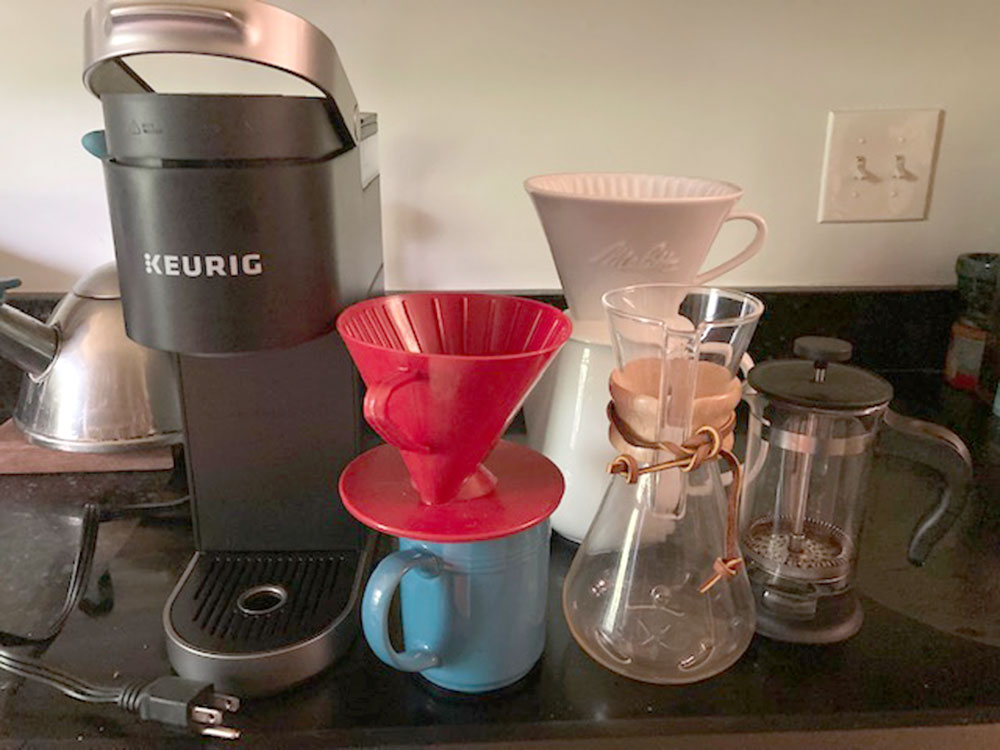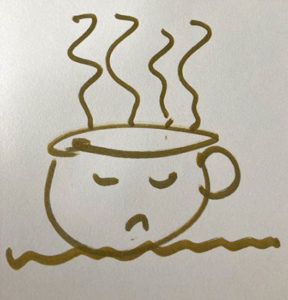
The recherche du cafe perdu (with apologies to Proust) has led to a barrage of new equipment in the Geracimos kitchen. / Photo by Ann Geracimos. / Photo on front from iStock.
By Ann Geracimos
WHY OF LATE had the taste and smell of my laboriously executed morning cup of filter coffee not seemed the same? Where was that fully charged mouth-warming feel and heavenly aroma? Had my taste buds gone south, or had my memory soured?
This wasn’t Covid’s fault, as I was first aware of the change before the virus appeared to kidnap many people’s olfactory and gustatory sensations. What might science say by way of an explanation of my plight, I wondered?
A website called Aging Care had a story headlined “Why Seniors’ Tastes Change with Age”—not whether, just why. Perhaps they had a clue. “At birth, most people have between 2,000 and 10,000” taste buds, and the olfactory system is key to enjoying them, I learned. So too bad if you have a stuffy nose or allergies. “Typically taste bud cells are replaced every week or two, but after age 50, these cells begin to lose their sensitivity and ability to regenerate,” I read.*
No authority was named, though the site implied that age likely was involved in “a weakening” of crucial olfactory nerve endings as well.
I had been fussy about buying only fresh-roasted beans from “sustainable” sources. I ground my own and used the best brewing method recommended. Different beans, different methods: Chemex, Melitta, French press. I preferred a brown paper filter and the correct water temperature for the pour. If my respiratory system was down, temporarily or otherwise, I would have expected to notice improvement over time.
From Bill Bryson’s impressive 2019 book titled The Body, I learned some more about these important taste receptor cells, the most regenerative cells in the body. Taste plus smell accounts for “at least 70 percent of flavor or maybe more,” he wrote, without saying whether the age factor mattered. I dipped into Michael Pollan’s recent investigation into the power of caffeine, coffee’s dominant ingredient, which he describes as “the most widely used psychoactive drug in the world.” He called caffeine “insidious”—an addiction—and set out to cure himself of the habit.

Sigh. / Illustration by Ann Geracimos.
I warmed to a column in the New York Times by Personal Health writer Jane Brody that cited studies about the healthy advantages of consuming caffeine, while also stating that “positive effects of the beverage can be undermined by how you make it and take it.”
Fascinating material, but I was far astray from my personal challenge to recover what I perceived was the lost euphoria and stimulation that come of drinking my favorite wake-up juice each morning. What I also was noticing was how so many articles about popular consumer foods cite warnings directed at the aging or elderly populations. Aging itself seemed a disease.
Thinking I may have an undiagnosed minor respiratory condition, I dug deep into my closet to resurrect the humble Neti Pot that employs a saline solution to wash out nasal passages. The expiration date was long over on my model, but I persisted to no avail. I saw no significant improvement the next day.
I turned next to the Monell Chemical Senses Center in Philadelphia, which calls itself “the world’s only independent, non-profit scientific institute dedicated to interdisciplinary basic research on the senses of taste and smell.” If anybody could tell me what I needed to know, surely they could.
What might be the latest research into the relationship between aging and the senses that might help explain my none-too-dire predicament? Monell “Member Emerita” Beverly J. Cowart, PhD, answered me in an email.
She agreed that “in general, the olfactory system is much more vulnerable to all kinds of losses—including age-associated ones—than is the sense of taste” while admitting that such losses impact “flavor perception, which can be difficult to distinguish from a true taste loss.” It’s true, she said, a loss of “taste sensitivity” may vary with the person. Likewise, the smell factor is difficult to tackle with any certainty given the “hundreds of thousands of odors” out there. “Smell is more substantially affected in aging (on average) but its loss is also not a uniform effect. The environment you’ve lived and worked in, your general health and your body’s regenerative capacity, and the extent to which you use your sense of smell may all play a role. . . .”
Maybe my mind’s eye had been playing tricks on me after all? How was I to know for sure?
Frustrated, I abandoned my research and opted to buy the trendy hands-free electric Keurig machine that involves the use of pre-filled coffee cups called pods and—theoretically anyway—the perfect pre-set temperature for brewing. It was a blow to my conscience since the jury still is out on whether even the improved pods are bad for the environment. A “Strong” brew button on the top was encouraging but hardly reassuring that heavenly taste and aroma would result.
With my K-Mini Plus designed to deliver a great cup in record time, I knew I was settling for efficiency over higher aesthetics. Nor did I get much comfort from the additional purchase of a so-called universal pod cup that, in theory, would allow me to use my own coffee each time to prevent the waste of successive pods.
So just for kicks (maybe literally), I bought a box of Starbucks’s pre-filled pods, which boast of containing two times more caffeine.
Neither snobbery over brewing methods nor debate over caffeine’s influence on the body is on a par with present pandemic muddles. These are Uncertain Times in all quarters. Soulful drinking in any form might help us get through.
Of course: “All details are subject to change.”
*The most frequently replaced cells in the human body are the cells that line the stomach wall and intestine. They typically last about five days before regeneration. Skin cells are replaced every two to four weeks.
MyLittleBird often includes links to products we write about. Our editorial choices are made independently; nonetheless, a purchase made through such a link can sometimes result in MyLittleBird receiving a commission on the sale. We are also an Amazon Associate.
